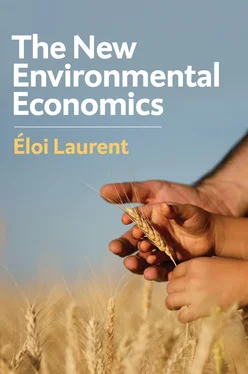1 Dedication Dedication For Sylvie, for Lila, for Jonas, with everlasting love
2 Title page The New Environmental Economics Sustainability and Justice Éloi Laurent polity
3 Copyright page Copyright page Copyright © Éloi Laurent 2020 The right of Éloi Laurent to be identified as Author of this Work has been asserted in accordance with the UK Copyright, Designs and Patents Act 1988 First published in 2020 by Polity Press Polity Press 65 Bridge Street Cambridge CB2 1UR, UK Polity Press 101 Station Landing Suite 300 Medford, MA 02155, USA All rights reserved. Except for the quotation of short passages for the purpose of criticism and review, no part of this publication may be reproduced, stored in a retrieval system or transmitted, in any form or by any means, electronic, mechanical, photocopying, recording or otherwise, without the prior permission of the publisher ISBN-13: 978-1-5095-3380-0 (hardback) ISBN-13: 978-1-5095-3381-7 (paperback) A catalogue record for this book is available from the British Library Library of Congress Cataloging-in-Publication Data Names: Laurent, Eloi, author. Title: The new environmental economics : sustainability and justice / Eloi Laurent. Description: Cambridge, UK ; Medford, MA : Polity Press, 2019. | Includes bibliographical references and index. Identifiers: LCCN 2019017448 (print) | LCCN 2019021750 (ebook) | ISBN 9781509533831 (Epub) | ISBN 9781509533800 (hardback) | ISBN 9781509533817 (pbk.) Subjects: LCSH: Environmental economics. | Sustainable development. Classification: LCC HD75.6 (ebook) | LCC HD75.6 .L3785 2019 (print) | DDC 333.7--dc23 LC record available at https://lccn.loc.gov/2019017448 Typeset in 10.5 on 13pt Swift Neue by Fakenham Prepress Solutions, Fakenham, Norfolk, NR21 8NL Printed and bound in Great Britain by CPI Group (UK) Ltd, Croydon The publisher has used its best endeavours to ensure that the URLs for external websites referred to in this book are correct and active at the time of going to press. However, the publisher has no responsibility for the websites and can make no guarantee that a site will remain live or that the content is or will remain appropriate. Every effort has been made to trace all copyright holders, but if any have been overlooked the publisher will be pleased to include any necessary credits in any subsequent reprint or edition. For further information on Polity, visit our website: politybooks.com
4 Figures Figures Graphs 1.1 Three ages of human development 5.1 Oil prices, 2008 – 2018 6.1 Renewable internal fresh-water resources per capita 7.1 European Union emissions of GHG in production and consumption 11.1 Globalization in the last 50 years 12.1 Percentage of population residing in urban areas by country, 1950 – 2050
Graphs Boxes Figures Tables
5 Introduction: Economics for the twenty-first century Notes
6 Part I Ideas and tools
7 1 What the classics know about our world; what twentieth-century economics forgot The physiocrats: Natural resources as political power Malthus and sustainability analysis David Ricardo and planetary boundaries John Stuart Mill and the steady state What twentieth-century economics forgot Notes
8 2 Humans within the biosphere: The paradox of domination and dependence Human evolution toward planetary dominance: The small household and the bigger one The biosphere: Interdependence and collaboration Thermodynamics and material flow analysis: A wider economics Social and natural systems, standing and collapsing together Notes
9 3 Governing the commons fairly Environmental history: Social and natural systems in perspective The early beginnings of environmental governance: Preservation and conservation Governing the commons, from Garrett Hardin to Elinor Ostrom Notes
10 4 Spheres of environmental justice The Marxist approach Eco-feminism Indigenous environmentalismThe Cochabamba Declaration of December 8, 2000 World People’s Conference on Climate Change and the Rights of Mother Earth April 22, 2010 The capabilities approach Notes
11 5 Natural resources, externalities, and sustainability: A critical toolbox The economic nature of environmental goods The many values of natural resources The problem of social cost and its imperfect solutions Notes
12 Part II Twenty-first-century social-ecological challenges
13 6 Biodiversity and ecosystems under growing and unequal pressure Plants and animals Seas and oceans Fresh water Forests Land and soil Agriculture Energy Notes
14 7 Beyond EXPOWA (extraction, pollution, and waste) Physical trade Pollution and waste Resource efficiency Circular or perma-circular economy? Notes
15 8 Energy, climate, and justice Energy and climate: The carbon problem Climate policy: Mitigation Negotiating climate Climate justice: Fair and efficient Notes
16 9 Well-being and our environment: From trade-offs to synergies Well-being and sustainability: From a vicious to a virtuous cycle The health-environment double dividend Energy transition and job creation Measuring well-being, resilience, and sustainability to change policy for the better Notes
17 10 Social-ecology: Connecting the inequality and ecological crises The rise of environmental inequality Risk, Noise, and Chemical Pollution Access to natural resources (food, energy, water) Exposure to social-ecological disasters From the welfare state to the social-ecological state Reading of Figure 10.2 Notes
18 11 The social-ecological transition in context: Capitalism, democracy, globalization, and digitalization Anthropocene or Capitalocene? Democracy or “green” dictatorship? Globalization and its environmental discontent Digital and ecological transition: Friends or foes? Notes
19 12 Urban sustainability and polycentric transition What is a city? The rise of cities Justice and the city The ecological impact of cities The ecological impact on cities Toward sustainable urban systemsRe-inventing the city Measuring and advancing urban well-being Fostering the “polycentric transition” Notes
20 Conclusion: Open economics Notes
21 References
22 Index
23 End User License Agreement
1 Cover
2 Contents
3 1 What the classics know about our world; what twentieth-century economics forgot
1 ii
2 iii
3 iv
4 vi
5 vii
6 vii
7 1
8 2
9 3
10 4
11 5
12 6
13 7
14 8
15 184
16 9
17 10
18 11
19 12
20 13
21 14
22 15
23 16
24 17
25 18
26 19
27 20
28 21
29 185
30 22
31 23
32 24
33 25
34 26
35 27
36 186
37 28
38 29
39 30
40 31
41 32
42 33
43 34
44 35
45 187
46 36
47 37
48 38
49 39
50 40
51 41
52 42
53 43
54 44
55 45
56 46
57 47
58 48
59 188
60 49
61 50
62 51
63 52
64 53
65 54
66 55
67 56
68 57
69 58
70 59
71 60
72 61
73 62
74 63
75 64
76 65
77 66
78 67
79 68
80 69
81 70
82 189
83 190
84 71
85 72
86 73
87 74
88 75
89 76
90 77
91 78
92 79
93 80
94 81
95 82
96 83
97 84
98 85
99 191
100 192
101 86
102 87
103 88
104 89
105 90
106 91
107 92
108 93
109 94
110 95
111 96
112 193
113 97
114 98
115 99
116 100
117 101
118 102
119 103
Читать дальше












